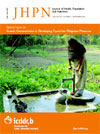
|
The Journal of Health, Population and Nutrition
icddr,b
ISSN: 1606-0997
EISSN: 1606-0997
Vol. 31, No. 4, 2013, pp. 471-479
|
 Bioline Code: hn13057
Bioline Code: hn13057
Full paper language: English
Document type: Research Article
Document available free of charge
|
|
|
The Journal of Health, Population and Nutrition, Vol. 31, No. 4, 2013, pp. 471-479
| en |
Factors Associated with Food Insecurity in Households of Public School Students of Salvador City, Bahia, Brazil
Bittencourt, Liliane de Souza; Santos, Sandra Maria Chaves dos; Pinto, Elizabete de Jesus; Aliaga, Marie Agnès & Ribeiro-Silva, Rita de Cássia
Abstract
This cross-sectional study was conducted to find out the factors associated with food insecurity (FI) in
households of the students aged 6-12 years in public schools of Salvador city, Bahia, Brazil. The study
included 1,101 households. Food and nutritional insecurity was measured using the Brazilian Food Insecurity
Scale (BFIS). Data on socioeconomic and demographic characteristics as well as environmental
and housing conditions were collected during the interviews conducted with the reference persons. Multivariate
polytomous logistic regression was used in assessing factors associated with food insecurity. We
detected prevalence of food insecurity in 71.3% of the households. Severe and moderate forms of FI were
diagnosed in 37.1% of the households and were associated with: (i) female gender of the reference person
in the households (OR 2.21, 95% CI 1.47-3.31); (ii) a monthly per-capita income below one-fourth of the
minimum wage (US$ 191,73) (OR 2.63, 95% CI 1.68-4.08); (iii) number of residents per bedroom below 3
persons (OR 1.91, 95% CI 1.23-2.96); and (iv) inadequate housing conditions (OR 1.84, 95% CI 1.12-4.49).
Socioeconomic inequalities determine the factors associated with FI of households in Salvador, Bahia. Identifying
vulnerabilities is necessary to support public policies in reducing food insecurity in the country. The
results of the present study may be used in re-evaluating strategies that may limit the inequalities in school
environment.
Keywords
Food insecurity; Socioeconomic inequalities; Students; Brazil
|
| |
© The Journal of Health, Population and Nutrition
Alternative site location: http://www.jhpn.net
|
|
